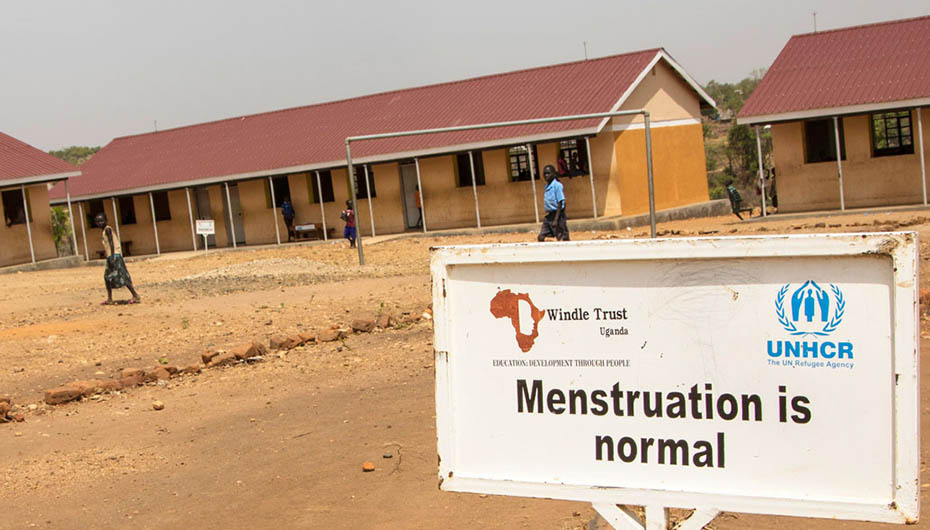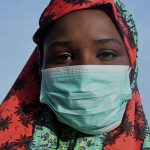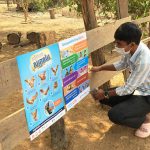Media Centre - Media release - 28 May 2020
Periods in a pandemic – From product shortages, pain and price gouging: new research reveals coronavirus is making periods worse for women and girls

Australian women and girls and their counterparts worldwide are experiencing multiple issues with managing their periods as COVID-19 lockdowns continue.
The charity for girls’ equality – Plan International Australia – has released its Periods in a Pandemic report for World Menstrual Hygiene Day (28 May). It reveals severe shortages of products, a sharp rise in prices of pads and tampons, and lack of access to basic information and services about menstrual hygiene management.
“From to Kenya to Nepal, to Australia, Ireland and Cambodia, COVID-19 lockdowns are causing big problems for people who menstruate. Periods don’t stop during a pandemic, but managing them has become a whole lot harder,” Plan International Australia’s CEO Susanne Legena said.
The charity, with assistance from The Body Shop Australia, surveyed 661 people who menstruate in Australia.
“Here in Australia, half those we surveyed said they had trouble finding period products, particularly when panic buying started. There were also widespread reports that prices have risen and remain higher than usual, with one in five of our survey participants reporting this was the case. We would strongly encourage retailers to ensure that menstrual hygiene products remain affordable during this time, particularly when people are struggling financially.
“Unfortunately, some of our survey participants said the pandemic had created extra stress and pressure which had amplified their PMS or made their periods more painful. We also received reports that people were delaying or avoiding seeing a GP for fear of either contracting coronavirus or taking up resources for those who have it. We would echo previous calls from medical experts to go and see your GP as usual and never to put it off, particularly now telehealth appointments are widely available.”
Problems with disposing of products also caused problems for a quarter of survey participants, as public toilets have been closed.
Ms Legena said the results of the survey show that Australian girls face shared challenges with girls all around the world in realising their right to effectively and safely manage their periods during this pandemic.
“This survey demonstrates that Australian girls face shared challenges with girls around the world in realising their right to effectively and safely manage their periods during the pandemic. As the restrictions lift, governments and businesses have an opportunity to hear girls’ experiences and improve access to sanitary products and support girls to manager their periods.”
The Australian survey results complement a global study conducted in tandem with this research. Plan International also surveyed 61 professionals working in the field of menstrual hygiene management, water, sanitation and hygiene and sexual reproductive health rights across 24 countries (see report for full list).
“Internationally, Plan International’s experts working on the frontline of menstrual hygiene management have reported serious and widespread issues,” Ms Legena said.
“In particular, they are finding it difficult to source products, have reported intentional inflation of prices, and serious issues with sanitation and reliable access to information. In many countries, period products have become scarce and vulnerable girls and young women, in particular are going without.”
‘Periods in a Pandemic’ survey – international survey results (WASH professionals across 23 countries reported):
- Restricted access to products, through shortages or disrupted supply chains – 73% agreed
- Restricted access to facilities to help change, clean and dispose of sanitary products – 68% agreed
- An increase in price of products – 58% agreed
- Lack of access to information and services – 54% agreed
- Reduced access to clean water to manage periods – 51% agreed
- A less hygienic environment for disposal of products – 47% agreed
- Increased stigma, shaming or harmful cultural practices – 24% agreed
“As schools remain closed, the option for safe and reliable options to change and dispose of products, as well as support networks and reliable information, is now not an option for many.
“In some cases, stigma and shame associated with menstruation is on the rise. These issues existed before the pandemic, but we know that this virus has in many cases made the situation worse.”
“With the pandemic significantly affecting livelihoods and household incomes, it is harder now for people, including adolescent girls, to afford to buy sanitary products than before the COVID-19 pandemic began, even when products are available. When sanitary products are hard to obtain, it means people might resort to using unhygienic alternatives that can increase their risk of reproductive and urinary tract infections.”
Plan International is calling on governments and health agencies to urgently assist girls, women and people who menstruate to manage their periods safely and with dignity.
“Menstrual hygiene management must be built into COVID-19 health responses and whilst lockdowns continue, it should be built into remote learning curriculums,” Ms Legena said.
“We know that people with disabilities and people from marginalised communities, like refugees for example, are more profoundly impacted by these issues, so their menstrual health and hygiene must be prioritised in responses to the pandemic.”
Plan International Australia is currently distributing dignity kits to communities in need all around the world. A Dignity Kit has all of the essentials people who menstruate need to manage their periods during a crisis like COVID-19. The kit includes menstrual pads, body soap, washing soap for clothes, toothbrushes, shampoo and toilet paper. You can pay it forward and purchase a dignity kit, which will help a girl manage her period, here.
About Plan International Australia
Put simply, we’re the charity for girls’ equality. We tackle the root causes of poverty, support communities through crisis, campaign for gender equality, and help governments do what’s right for children and particularly for girls. We believe a better world is possible. An equal world; a world where all children can live happy and healthy lives, and where girls can take their rightful place as equals.
Media contacts


